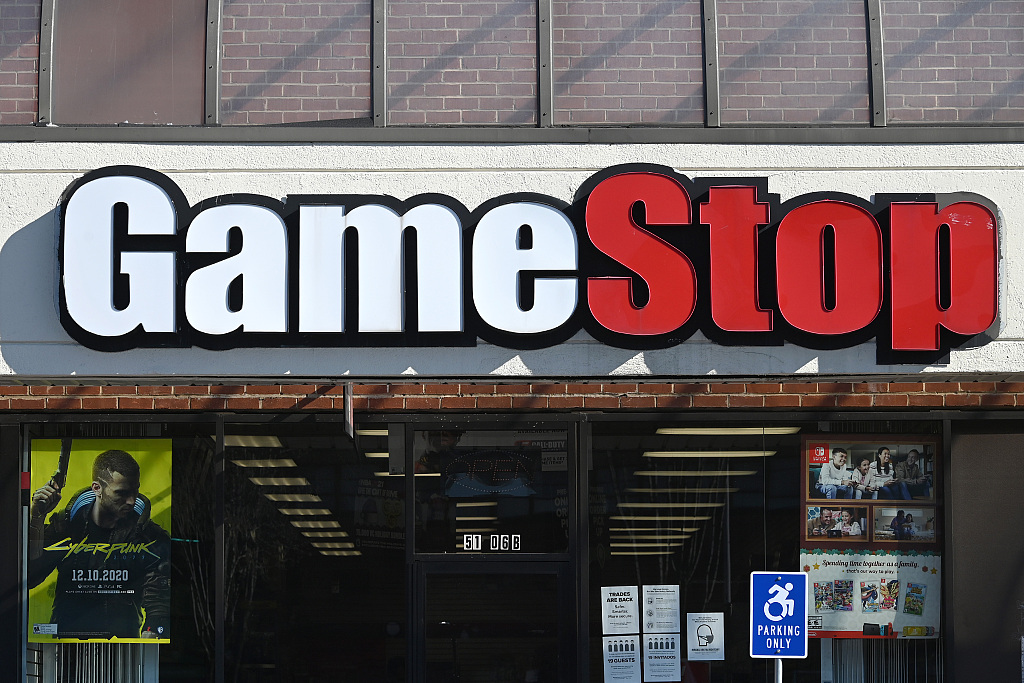Does the GameStop saga represent populism in US?
- By Mitchell Blatt
 0 Comment(s)
0 Comment(s) Print
Print E-mail China.org.cn, February 5, 2021
E-mail China.org.cn, February 5, 2021

The workings of America's financial markets are complex and barely understood by most Americans.
The performance of the stock market has become completely detached from the broader economy. In 2020, the coronavirus caused American GDP to contract by 2.3%, while the Nasdaq Composite grew in value by 45% and the S&P 500 by 18%.
People with excess wealth made a killing investing in the stock market, while waitresses lost their jobs and cashiers braved coronavirus-infested department stores to make ends meet. Large corporations like Facebook and Amazon made record profits, while small businesses shuttered.
All this added fuel to the populist fire raging throughout American discourse. Populist sentiment has not decreased since the rise of Donald Trump. In fact, Joe Biden and other Democratic presidential candidates also appealed to populist fervor. For example, both political parties criticized Wall Street for its excesses.
But it was not just the big boys on Wall Street who profited from the frenzied stock market in 2020. Small net-worth individuals who were bored at home threw money into new online brokerage platforms which offered fractional shares and no fees. According to Citadel Securities, individual investors accounted for almost 25% of all stock market activity in 2020, more than doubling from 2019.
The new money in the market is younger, less knowledgeable, and more populist than the old. Most individual investors haven't studied finance or interned at a bank and they are inherently skeptical of "Wall Street" – a catchall for America's financial industry.
Therefore, when a community of day traders on Reddit found out that many major hedge funds had shorted large shares of GameStop stock, they decided to buy the shares to wreak havoc on the unpopular hedge funds. Short selling occurs when an investor borrows a stock to sell it for a profit when the stock declines in value. However, short selling runs the risk of losing virtually unlimited amounts of money if the stock keeps appreciating.
The rise of GameStop stock, which hit a brief peak above $400 a share, was immediately cast in the populist framing of the "people vs. Wall Street." However, this narrative is frankly inaccurate on the details. While the framing might be an accurate representation of average American sentiment towards Wall Street, it is not a true portrayal of the facts in this particular case.
To begin with, Wall Street is not a behemoth with singular interests and values. In fact, the various entities that comprise the financial system, including hedge funds, mutual funds, private equity and investment banks have different functions and different needs. Only a fraction of Wall Street activity comprises of short-selling.
Ironically, many institutional investors who held GameStop stock and sold at the right time made much more money than the day traders who bought and waited for GameStop to "fly to the moon." BlackRock, one of the big three index funds on Wall Street, reportedly made over $1 billion selling its holdings of GameStop. Silver Lake, a private equity firm, made $700 million selling AMC, another stock Reddit investors had touted.
Meanwhile, individual investors who bought GameStop or AMC at their peaks are losing big money. GameStop dropped 75% from its highest point and looks set to continue falling. Reddit investors, pushing their populist narrative, are demanding everyone buy and keep holding. But artificially inflating the market cannot last for long. Their strategy relied on convincing people to buy the stock at prices much higher than its true value; those poor traders who lost it all are the primary victims.
One misleading claim that fueled the narrative is the suggestion that Robinhood and Ameritrade, two of the leading no-fee brokerages, limited purchases of GameStop in cahoots with Wall Street.
The reality of the matter, where Robinhood did not do a good job of communicating in the immediate moment, is that SEC regulations require trading houses to have enough capital on hand to settle trades. Stock purchases go through the brokerage first before being credited to the clients' accounts. But with the price of the stocks fluctuating so wildly and so many users trading the same stocks, the brokerages risked running out of money. In fact, Robinhood did open up trading again after getting a cash injection overnight.
The day traders can be forgiven for not knowing about these SEC regulations. Finance is complicated, and many were first-time hobbyist investors (although even seasoned professionals often don't know what they're doing, as with the 2007-08 housing bubble caused by the banks).
Ultimately, the populist narrative fits into American public discourse better than the facts. The populist narrative, from a broader perspective, is sometimes accurate, but the GameStop controversy was not a case of the elites sabotaging the common man. However, there are enough real examples of that happening.
The problem, however, in taking up a false example as the representation of a real problem is that it could lead to the wrong solutions being implemented.
Mitchell Blatt is a columnist with China.org.cn. For more information please visit:
http://www.china.org.cn/opinion/MitchellBlatt.htm
Opinion articles reflect the views of their authors, not necessarily those of China.org.cn.
If you would like to contribute, please contact us at opinion@china.org.cn.






Go to Forum >>0 Comment(s)